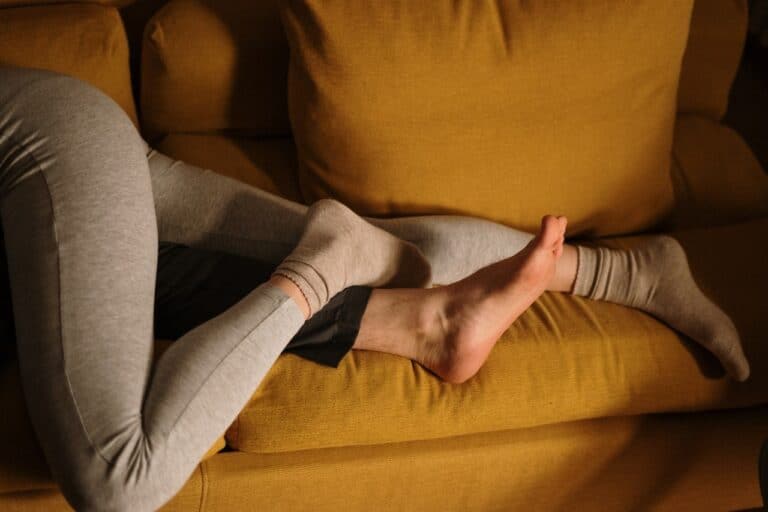Why Can’t I Sleep After Sex?
If you can sleep immediately after sex, you’re lucky. Because there are several who can’t immediately sleep after they have had sex and the reasons for that could be numerous.
And this can happen to both women and men.
In this blog post, I will help you find what could be the reason for not getting any sleep after you had sex and also provide some info on what you can do to tackle it.
Let’s get to it…
The science behind sleep and sex
Sex and sleep are both complex psychological processes involving a wide range of hormones, neurotransmitters, and other chemicals in the body. As a result, engaging in sex can have a significant impact on sleep quality, sometimes positively and sometimes negatively.
First, it’s important to understand the different stages of sleep. There are generally four stages of sleep, each with its own unique characteristics.
- The first stage is light sleep, where you may still be somewhat aware of your surroundings.
- The second stage is a slightly deeper sleep, where your heart rate and body temperature start to drop.
- The third stage is deep sleep, which is the most restorative stage of sleep.
- The fourth stage is REM sleep, which is where you typically experience vivid dreams.

Sex can impact each of these stages of sleep in a positive way. For example, during sex, your body may release hormones like dopamine, oxytocin, and prolactin. These hormones are associated with feelings of pleasure, bonding, and relaxation. This can be beneficial for sleep, as it can help you feel more relaxed and comfortable, and can also reduce stress and anxiety levels.
However, sex can impact sleep quality in a negative way as well. For example, sex can be physically demanding, which can make it difficult to relax and fall asleep immediately afterward. Additionally, engaging in sex may cause physical discomfort or pain, which can make it difficult to find a comfortable sleep position.
One thing to keep in mind is that the impact of sex on sleep can vary depending on the individual. Some people may find that sex helps them sleep better, while others may find that it makes it more difficult to fall asleep or stay asleep.
Factors that affect sleep quality after sex
Here’s a list of factors that can affect sleep after sex, along with brief descriptions of each:
- Physical exertion: Engaging in sexual activity can be physically demanding, which can make it difficult to relax and fall asleep immediately afterward.
- Timing: The time of day that you engage in sexual activity can impact your sleep. Engaging in sex too close to bedtime may make it more difficult to fall asleep, while engaging in sex earlier in the day may have less of an impact on sleep quality.
- Emotional state: Your emotional state before, during, and after sexual activity can impact sleep quality. If you’re feeling stressed, anxious, or overwhelmed, it may be more difficult to relax and fall asleep afterward.
- Pain or discomfort: Pain or discomfort during sexual activity can make it difficult to find a comfortable sleep position afterward, which can impact sleep quality.
- Medications: Certain medications, such as antidepressants or stimulants, can impact sleep quality after sex.
- Alcohol and drugs: Using alcohol or drugs before or during sexual activity can impact sleep quality by interfering with the body’s natural sleep patterns.
- Noise and light: External factors such as noise and light can impact sleep quality after sex. It’s important to create a relaxing sleep environment to promote restful sleep.
- Partner: The presence or absence of a partner can impact sleep quality after sex. Some people find it easier to sleep with a partner, while others may prefer to sleep alone.
- Physical health: Underlying health issues or physical conditions can impact sleep quality after sex, such as chronic pain or sleep disorders.
- Hormones: As I mentioned earlier, hormones play a significant role in sleep after sex. The release of hormones such as oxytocin and prolactin can promote relaxation and sleep, while other hormones may interfere with sleep quality.

Strategies for better sleep after sex
And if you are wondering whether you can do anything about the difficulty in sleeping after sex, here are some tips to help you out.
- Allow time for relaxation: After sexual activity, allow yourself time to wind down and relax. This can include activities such as reading a book, taking a bath, or meditating.
- Practice good sleep hygiene: Good sleep hygiene practices, such as keeping a consistent sleep schedule and creating a relaxing sleep environment, can help to promote better sleep after sex.
- Exercise regularly: Regular exercise can help to reduce stress and promote better sleep quality, which can be beneficial after sexual activity.
- Avoid stimulants: Avoiding stimulants such as caffeine, nicotine, and alcohol before bedtime can help to promote better sleep quality after sex.
- Address underlying health issues: If you have an underlying health issue that is impacting your sleep after sex, it’s important to address it. This may involve seeking treatment for a sleep disorder or working with a healthcare provider to manage chronic pain.
- Engage in relaxation techniques: Relaxation techniques such as deep breathing, meditation, or progressive muscle relaxation can help to promote relaxation and reduce stress levels.
- Communicate with your partner: If your sleep after sex is being impacted by your partner’s behavior or preferences, it’s important to communicate openly and work together to find a solution that works for both of you.
- Try different sleep positions: Experimenting with different sleep positions after sexual activity may help to find a position that is more comfortable and conducive to sleep.
And yes, these tips and strategies apply to both men and women.
If you’re experiencing ongoing difficulty sleeping after sex, it may be helpful to seek support from a mental health professional or sleep specialist who can provide additional guidance and support.
Read next: Decoding the Spiritual Significance of Sex Dreams
Final words
The relationship between sleep and sex is a complex one, and many factors can impact our ability to get restful sleep after sexual activity. From hormones to emotional state and sleep hygiene, there are many variables to consider when trying to promote better sleep after sex.
By understanding the factors that can impact sleep and using strategies such as relaxation techniques, good sleep hygiene, and communication with partners, it is possible to improve sleep quality after sexual activity.
If you have a related query, feel free to let me know in the comments below.






